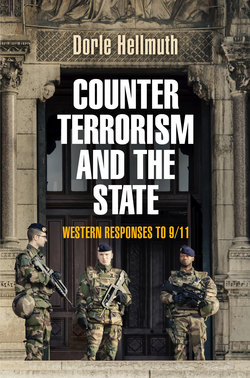Counterterrorism and the State

Реклама. ООО «ЛитРес», ИНН: 7719571260.
Оглавление
Dorle Hellmuth. Counterterrorism and the State
Отрывок из книги
Counterterrorism and the State
WESTERN RESPONSES TO 9/11
.....
On May 1, 2003, TTIC started operating under former CIA Deputy Executive Director John Brennan. Two months later, the joint venture had built a cadre of 100 analysts and liaison officials, one-third of its final capacity. Very quickly it became clear that TTIC would either carry out many of the functions intended for DHS or overlap with DHS’s IAIP in the area of threat-related analysis. TTIC was designed as the new focal point for terrorist threat analysis. As an interagency joint venture, it was supposed to ensure “rapid and unfettered sharing of relevant information across departmental lines … collaps[ing] bureaucratic barriers and clos[ing] inter-jurisdictional seams.”211 TTIC would also be responsible for compiling daily all-source terrorist threat assessments for the president and other members of the senior leadership—for the first time, the president would be able to rely on a single stream of intelligence on terrorism.
Lawmakers viewed the decision to create TTIC outside DHS as a violation of the new department’s statutory mandate. From a legislative point of view, DHS was created in part as an “intelligence fusion center” with the core responsibility of consolidating, analyzing and acting on all terrorist-related threat information.212 Placing the information fusion center outside the department seemed to violate a core purpose for creating it in the first place.213 Members of Congress also worried that the center had created an accountability vacuum. While TTIC as a whole reported to the CIA director, its various components continued to report to their respective agencies and departments. Asked about who would take responsibility “when some bit of intelligence is not properly viewed or vetted for what it is and something bad happens as a result,” TTIC Director John Brennan could only suggest that it would be “very case-specific.”214 Some lawmakers also feared that the work of the new center could violate the law that prohibits the CIA from law enforcement or internal security functions, since TTIC would also be responsible for the analysis of domestically collected information—a concern magnified by TTIC’s organizational affiliation with and physical proximity to the CIA.215
.....